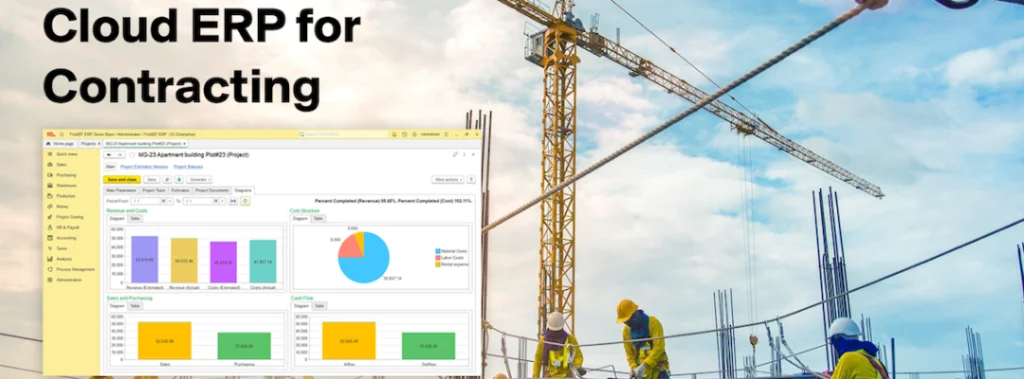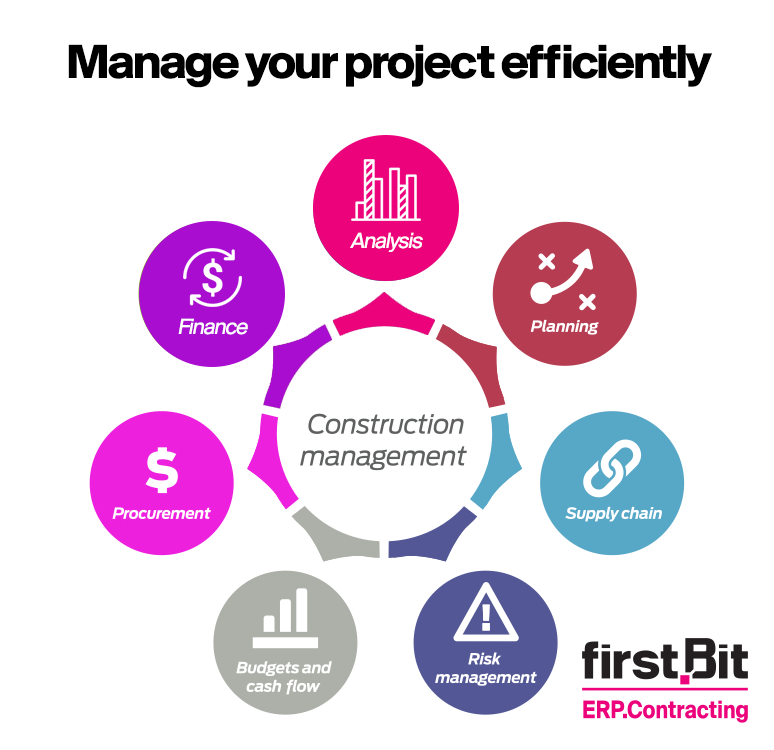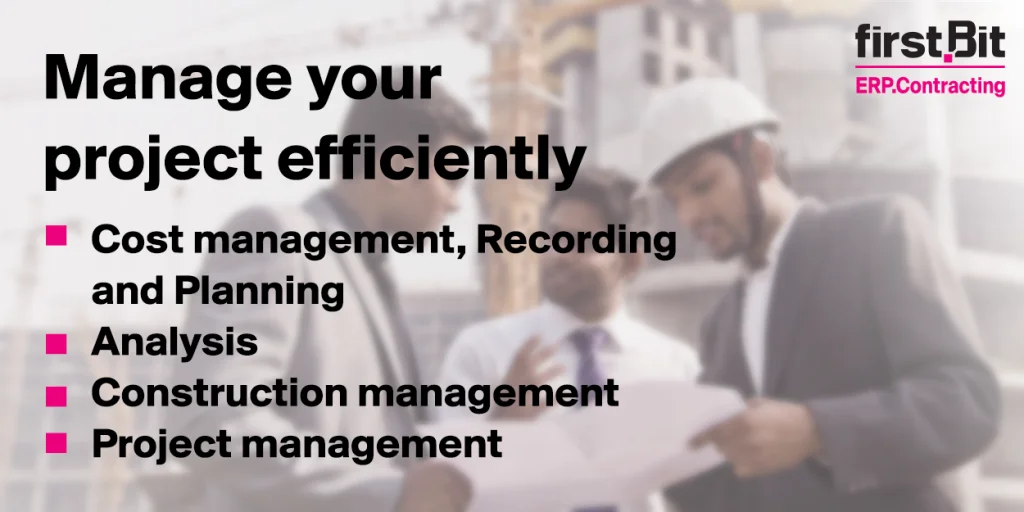
ERP Software for Contracting Companies and Avoiding Implementation Failure

ERPs or Enterprise resource planning solutions have a range of applications in the contracting industry. The use of ERP for contracting companies helps boost profitability and efficiency while making it easier to calculate costs, keep track of projects, manage schedules, purchase orders, and many project specifications.
ERPs can help simplify the overall accounting and contracting process, reducing human errors and speeding up the production process. However, for the best results, they must be appropriately implemented within an organization after thorough research. There can be numerous challenges in ERP implementation which may adversely affect contracting firms and their employees.
Common ERP Implementation Problems In Contracting Companies
When planning to introduce a new ERP system to your entire organization, you must expect some initial resistance and difficulties in adapting. ERPs can simplify processes and provide exceptional results over time. However, they need to be adopted, implemented, and accepted by your organization first.
Here are a few challenges that most organizations face while implementing a new ERP solution:
1. Resistance to adopting new technology
Most of your long-term employees who have gotten used to an existing system or work style will resist new technology. Your staff may also find your new ERP system inconvenient or faulty, and it may take time to get them fully on board.
2. Changing processes & workflows
Introducing an ERP into your contracting firm or switching to a new system may also be difficult for your workforce. Many of your
ongoing processes might get disrupted temporarily, causing confusion and complaints with the new system. However, you must remember that if your staff avoids using the software, the chances of success are dismal. On the other hand, a few weeks of persistence and patience can yield the desired results.
3. Limited training
Training your staff on the new ERP is crucial for its success. Most companies fail to realize that training staff on the job or assuming they will learn the new system gradually can have a detrimental effect on the organization. Untrained or undertrained employees can often sabotage the results/insights that are to be derived from the ERP.
4. Lack of implementation structure
Dumping new software on your employees and expecting them to drive it forward by themselves is one of the biggest mistakes you can make. For successful implementation, it is wise to chalk out a plan according to departments and user roles. This will ensure that all business processes and verticals can learn and adapt to the software.
Contracting ERP Features

While choosing an ERP for contract management, you must look for a few essential features, which are listed below:
-
Job Cost Accounting: Since contracting involves taking up tasks for clients and getting them done via your workforce, you need to calculate the exact person-hours spent per job. This could be for multiple job roles and types and involve numerous locations. This ERP module helps you compute the precise costs per job and estimate them beforehand.
-
Multi-Company/Location Management: Contracting companies often have to deal with a single organization having multiple entities and locations. Hence your contract manufacturing ERP must have a dedicated module/feature to accommodate multiple companies and locations.
-
Equipment Usage: The ERP you choose must also allow you to factor in the equipment used in construction and manufacturing, calculate their costs per day/hour, and factor in things like repair and transportation costs.
-
Project Management: Contracting companies take on multiple projects that work simultaneously. Hence, it is essential to have a contract management module in your ERP that calculates project costs, progress, and task/workforce requirements. This will give you real-time visibility over how each project is progressing.
-
Labor Work & Time Management: Your contracting ERP must also help you evaluate labor costs on different jobs and help you manage permanent and contractual employees. The system should also be able to calculate their pay as per agreed payment rates and sync with your accounting department automatically.
-
Cost and Budgeting Control: This is one of the essential features required in a contracting ERP. This feature helps you analyze where your money is being spent and allows you to analyze and allocate budgets for different teams, activities, and projects.
-
Estimation and Quotation Management: Contracting ERPs must have a module/feature that helps them estimate the cost of a job and provide quotes to their clients digitally.

Major Challenges in Contracting Industries
There are several challenges that contracting companies face regularly. ERPs for contracting companies are devices specifically to address such challenges and help firms overcome them.
Let's take a look at some of the recurrent challenges faced by contracting firms:
-
Increased Cost of Materials: Factors like inflation, conflicts, tariffs, and increased global demand lead to increased costs of production materials. Contracting ERPs help organizations factor in such changes/fluctuations and help them create budgets appropriately, leading to more accurate bidding pricing.
-
Poor Project Performance: Contracting projects can fail mainly due to failure to deliver within specific timelines and going over budgets. Thankfully, an ERP for contracting companies has modules that help in budgeting and overseeing projects' progress.
-
Shortage of skilled labor: Along with managing labor costs, contracting firms also have to deal with the dearth of skilled labor. Today, the construction industry alone employs over 7.2 million professionals. Contracting ERPs let you understand the skills in demand and help you create, train, and manage a vast talent pool of professionals, ensuring that you can take on the projects you desire.
-
Poor Productivity: Productivity loss in the contracting industry may arise due to various reasons. It could be due to weather, malfunction of machinery, friction between stakeholders, design complications during construction, delay in the supply of shipments/materials, and several other factors. ERPs can help analyze and overcome such difficulties, helping you boost productivity levels throughout the organization.
Planning to Avoid ERP Implementation Failure
Introducing an ERP affects the bottom-line results of the entire organization. Hence, there are a few best practices to be followed for the successful implementation of ERPs, which are mentioned below:
1. Keeping Employees Informed:
The lack of communication between teams, departments, and employees is the biggest hindrance to an ERP's success. Additionally, the choice of ERP for an organization must be made, keeping in mind the challenges employees face at different levels within the organization. Hence, discussion with employees about their key concerns and factoring in their feedback could help you make a better choice of ERP system to be implemented.Once the implementation is complete, you should also interact with users at different levels of the company, ask for their feedback and provide updates on how the system is performing. This would build transparency and improve credibility, helping your new endeavor become successful.
2. Take Time for Training:
3. No High Expectations:
4. No Rush to Success - Slow Implementation:
ERP Software Implementation Strategy

In order to transition successfully into a new ERP system, you need to have a strategy in place for your organization, employees, and stakeholders. However, the effectiveness of the approach chosen depends on your organizational size, the investment required, ROI, and the risks involved.
The most common strategies for ERP implementation include:
-
Phased Rollout
-
Big Bang (Single-step Implementation)
-
Parallel Adoption
-
Hybrid Approach
Start Using the Best ERP System in Dubai by First Bit
First Bit is one of the leading ERP software providers in Dubai, UAE, which focuses on creating customized business solutions for specific business roles and processes. Our dynamic and versatile team has years of expertise in delivering top-notch ERP solutions to augment business growth, reduce risks, simplify operations and boost productivity.
First Bit offers a complete suite of fully-integrated accounting software for the contracting industry, along with user-friendly ERP solutions for effectively managing contracts and subcontracts.
Request a demo with our product experts and witness how you can leverage our contracting ERP software to generate the best outcomes for your business and make it go places.
of your processes and scale your business with FirstBit ERP now!








